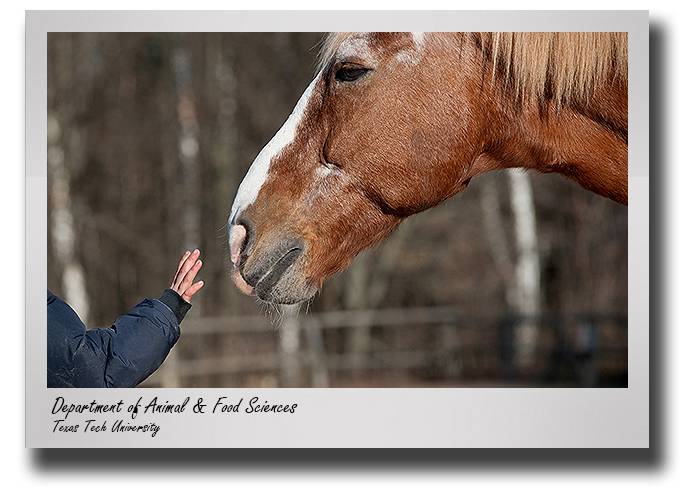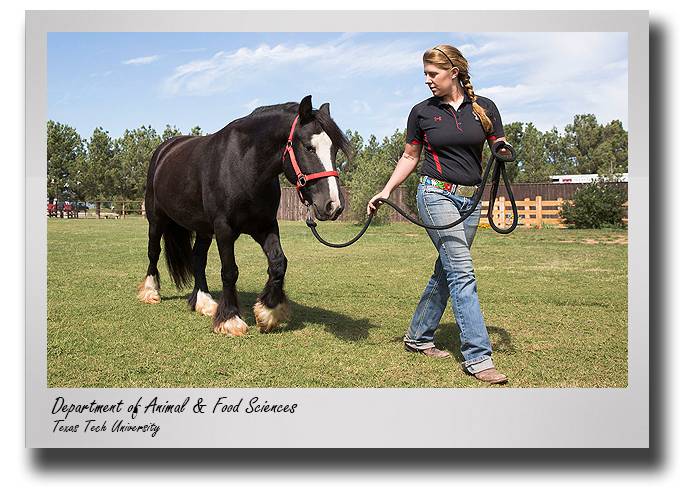Horses may improve outcomes in childhood obesity therapy: Study
By: Glenys Young
 As childhood obesity becomes an increasingly serious problem in the United States,
a pilot study from Texas Tech University shows that horse-ing around may be just what
the doctor ordered.
As childhood obesity becomes an increasingly serious problem in the United States,
a pilot study from Texas Tech University shows that horse-ing around may be just what
the doctor ordered.
Researchers from the Department of Animal & Food Sciences, Department of Psychological Sciences, and the Department of Kinesiology & Sport Management recently found that incorporating equine-assisted activities into a family group therapy intervention for childhood obesity actually motivated overweight children to attend treatment.
Jason Van Allen, an associate professor of clinical psychology and director of the Examining Nutrition, Exercise and Rest in Growing Youth (ENERGY) Laboratory, has been offering the Positively Fit intervention to the community through his lab for several years.
 Katy Schroeder, an assistant professor of companion animal science and director of the Equine-Assisted
Counseling and Wellness Laboratory and Clinic, housed at the Texas Tech Therapeutic
Riding Center; and Emily Dhurandhar, an assistant professor of kinesiology and director of the department's Nutrition
Laboratory, teamed up with Van Allen to adapt the curriculum for the equine-therapy
environment.
Katy Schroeder, an assistant professor of companion animal science and director of the Equine-Assisted
Counseling and Wellness Laboratory and Clinic, housed at the Texas Tech Therapeutic
Riding Center; and Emily Dhurandhar, an assistant professor of kinesiology and director of the department's Nutrition
Laboratory, teamed up with Van Allen to adapt the curriculum for the equine-therapy
environment.
The Positively Fit program is designed to address the weight-management needs of children, including caregiver education and support. During each session, the respective groups meet separately to discuss aspects of weight management with peers in the intervention. Caregivers and children also meet collaboratively during each session to discuss shared activities and priorities that can help both groups achieve the goal of improving the child's overall health and health behaviors.
"The program covers topics related to eating habits and dietary choices, increasing exercise and helping caregivers navigate the challenges of making changes in their family to support their efforts," Van Allen said. "For example, we discuss strategies for caregivers to help them address child misbehavior or frustration around making changes to their typical eating habits, as children often display some resistance to making these changes. We encourage caregivers to use positive reinforcement to help promote new habits and to model health behavior themselves by engaging in dietary changes and physical activity with their children."
Each family in the intervention was assigned a horse to work with throughout the program. Children were physically active for 45-60 minutes of each weekly session, participating in horsemanship activities such as learning to groom and lead the horses as well as practicing riding skills, which provided mild to moderate levels of exercise intensity.

"We designed horse activities primarily to reinforce concepts in the curriculum, but also to provide a fun way for families to learn the material and help children build self-esteem and confidence for healthy eating and exercising," Schroeder said. "Our program is quite innovative; this is the first time an animal-assisted intervention has been incorporated into a standardized intervention for childhood obesity, and it was very well received by our first group of families."
It also proved successful for the two families involved in the pilot study.
"We found that the multi-family group therapy format could be particularly advantageous in fostering a supportive learning climate for the families," Schroeder said. "Both children experienced increases in lean mass and decreases in fat mass, while also increasing their moderate to vigorous physical activity, from pre- to post-intervention, and each child's self-efficacy for physical activity also increased.
"After the intervention concluded, we conducted a focus group with the families, and their feedback was overwhelmingly positive. The caregivers and children agreed that the horses increased their motivation to participate in the program, and the group environment was helpful for gaining advice and support from each other."
The team recently presented their research at the American Psychological Association's 2019 Convention in Chicago. They are pursuing grant funding and hope to expand upon the research next year.
CONTACT: Katy Schroeder, Assistant Professor - Companion Animal Science, Department of Animal and Food Sciences, Texas Tech University at (806) 834-5894 or katy.schroeder@ttu.edu
1008NM19
Davis College NewsCenter
-
Address
P.O. Box 42123, Lubbock, Texas 79409-2123, Dean's Office Location:Goddard Building, Room 108 -
Phone
(806)742-2808 -
Email
kris.allen@ttu.edu
